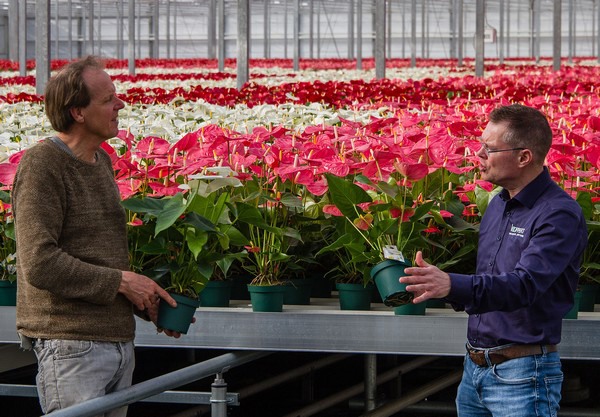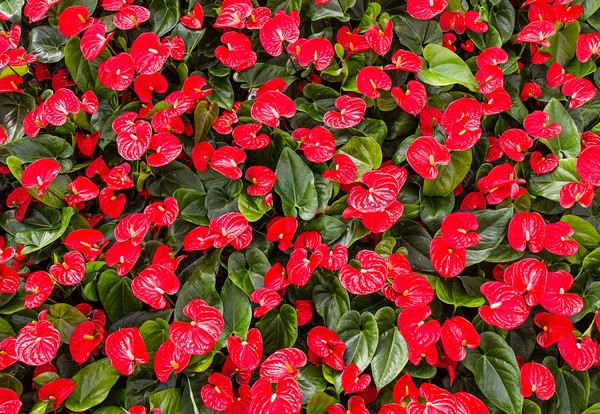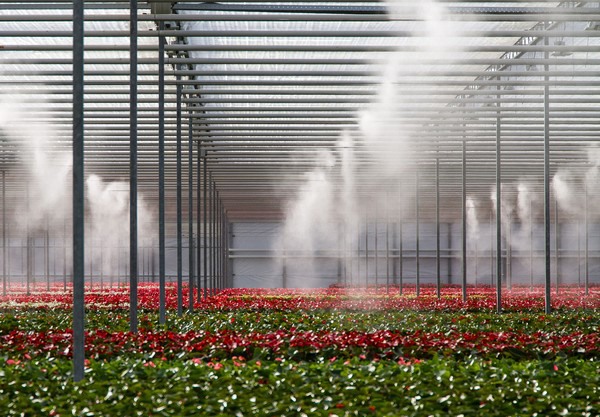‘This type of plant protection is a godsend for us’, says Dutch anthurium company Amazone Plants. They are at the top end of the market and biological plant protection is an additional pillar that supports this position.
Amazone Plants was established in 2010. During the initial few years, the anthurium company owned by Lex Scheffers and Fred van Zijl did not immediately have the wind at its back but the business started to take off in 2015. In 2019, the tomato nursery also owned by Van Zijl was converted, before being added to the anthurium nursery in 2020.

Lex Scheffers (left) and consultant Wim van der Meer. Lex describes biological plant protection as a godsend.
A remarkable move
‘Well, we had ten good weeks, Fred and I said to each other when the coronavirus crisis erupted and exports came to a standstill,’ Lex Scheffers recounts. The two partners made a remarkable move – they rented additional greenhouses. These were used to temporarily store a proportion of the growing plants. In the end, everything more or less turned out fine – the plants in 12 cm pots were sold in 14 cm pots in the summer, and the plants in 14 cm pots went to the buyers in 17 cm pots.
The company has focused on biological plant protection since it was founded. However, its highly automated production system makes this type of plant protection complex. The plants in the propagation phase enter the processing hall every nine weeks. During the nine week period that the plants are in the greenhouse, it is not easy for the employees to access the plants, for example to scout them. Infestations may therefore occur in the greenhouse that only become noticeable once the plants are in the hall.

Swirski-Mite LD does an excellent job at Amazone Plants where it is difficult for employees to scout in the greenhouse. There is always an army of thrips predators present in the crop.
Fantastic results with Swirski-LD
The main pests are the Western flower thrips, aphids (predominantly peach potato aphids and glasshouse potato aphids), and Duponchelia moths. Amazone Plants uses a variety of beneficial insects to keep these pests under control. Consultant Wim van der Meer names them for us.
Amazone Plants uses Macro-Mite to combat the pupae of the Western flower thrips and Swirski-Mite LD to combat the larvae. ‘At this company, Swirski-Mite LD produces fantastic results,’ Wim tell us. ‘The predatory mites continue to emerge from the insect netting at a good rate over a longer period. This means that there is always a strong population in the greenhouse crop and control of the thrips is maintained at the right level. The method works fine in this automated production system, which is, of course, very reassuring.’
The company still needs to take action against Echinotrips and anthurium thrips as the current thrips predators are not sufficiently effective against these pests. The company therefore sprays a product of natural origin, such as Mycotal, twice a year, in the spring and in the autumn. Wim van der Meer explains, ‘Koppert is involved in a trial in which we are investigating whether Chrysopa eggs are effective at tackling the two thrips varieties. Hopefully, it will be a success.’

Amazone Plants supplies its products to the more upscale dealers in Central, Southern, and Eastern Europe.
Biological plant protection is so much better
Amazone Plants controls aphids with a combination of the Aphipar parasitic wasp and the Aphidend gall midge, which, according to Lex Scheffers, is very effective. The predatory soil mite and thrips predator Macro-Mite is also used to combat the eggs of the Duponchelia moth. Pheromone traps capture the adult moths.
Lex Scheffers describes biological plant protection as a godsend. ‘It is going very well indeed. It would be unthinkable if we still had to keep using chemical products. After all, chemicals put so much strain on the safety of the employees, on the crops, and on the local environment. It has never been a favourite activity of mine. Biological plant protection is so much better. Although our buyers do not always ask explicitly for a completely clean product, this is the path we will continue to take.’
More upscale dealers
The company is almost six hectares in size and produces around two million plants a year, distributed across twenty or so varieties. These come from Anthura with whom they have a good relationship. Amazone Plants has acquired exclusivity for a number of cultivars from the breeder; it is the only company in Europe to produce these cultivars.
The available plants are primarily dispatched via exporters to garden centres, florists, and retailers in Central, Southern, and Eastern Europe. ‘These are the more upscale dealers,’ explains Lex Scheffers.
For more information:
Koppert Biological Systems
info@koppert.nl
www.koppert.nl
